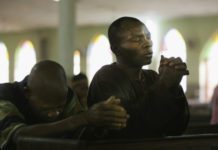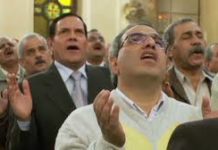By BosNewsLife Middle East Service with reporting by BosNewsLife’s Stefan J. Bos

CAIRO/BRUSSELS (BosNewsLife)– Egypt’s election commission failed Sunday to set a date for the first presidential election since the ouster of Hosni Mubarak, adding to Western concerns about the plight of minority Christians as Islamists have increased their influence.
The commission said in published remarks that the problem lay in organizing the expatriate vote.
In comments to BosNewsLife, a key member of the European Parliament, Peter van Dalen, warned that Egypt was now “in the grip of the Arab Winter.”
Van Dalen, who represents the Dutch ChristenUnie (ChristianUnion) party, told a parliamentary debate on human rights in Egypt that the “Arab Spring”, a reference to last year’s pro-freedom protests, only lasted a short time.
“The Arab Spring has now become the Arab Winter,” he told parliamentarians earlier this week in Strasbourg, France. He explained to BosNewsLife that he is particularly concerned about the rise of the hard-line Salafist Muslims of the Nour Party, who have become the second largest political force in the country.
STRONG PRESENCE
Anticipating a strong presence in the new Egyptian parliament, they have outlined plans for a strict brand of religious law, that critics say could limit personal freedoms and steer a key U.S. ally toward an Islamic state.
Hardline Salafis espouse a strict form of Islam similar to that practiced in Saudi Arabia, where security forces are known to have raided underground church groups.
Salafis, who often wear long beards and seek to imitate the life of the Prophet Muhammad, speak openly about their aim of turning Egypt into a state where personal freedoms, including freedom of speech, women’s dress and art, are constrained by Islamic law.
Van Dalen said the “extreme Salafis” can further create an atmosphere of hatred in Egypt’s society, where at least dozens of Egyptian Christians, also referred to as ‘Copts’, reportedly died in recent months in violence directed against them. Rights and church groups have blamed the on Muslim mobs, in several cases supported by security forces.
“There are many places where there is more violence than there are rights, for instance Alexandria, where last year many Cops were killed or [the capital] Cairo where people died in May when a church was torched,” Van Dalen explained.
Additionally, “in Al Hammadi there seems to be peace, but in reality Copts are oppressed,” the politician added.
MORE ATTACKS?
Church leaders earlier said they fear more attacks against Copts, who make up 10 percent of the 80-million-strong, mainly Muslim, population.
Van Dalen told BosNewsLife in a statement that he urged the European Union’s foreign policy chief, Catherine Ashton to make clear that Europe expect respect from Egypt’s rulers for religious freedom and human rights. Europe, he said, “offers hundreds of millions of euros in aid to Egypt” and shouldn’t be afraid to threaten with
withdrawing financial if the country’s human rights record does not improve.
Yet with apparently new disputes about the date of a presidential election, it was not immediately clear Sunday how Egypt planned the road towards full-fledged democracy, EU style.
Confirmation of a date in June had been expected but, analysts said that Sunday’s delay suggested there is a behind-the-scenes battle over the timing of returning from military to civilian rule.









Your article implies that Copts were burned to death in a church fire. “…last year many Cops were killed or [the capital] Cairo where people died in May when a church was torched. While Copts (and Muslims) have died in awful violence since last January that is a falsehood. They were killed as a result of clashes AFTER the fire. Stick to the facts if you want the truth to be told to the world, otherwise you are just another pundit with an agenda.